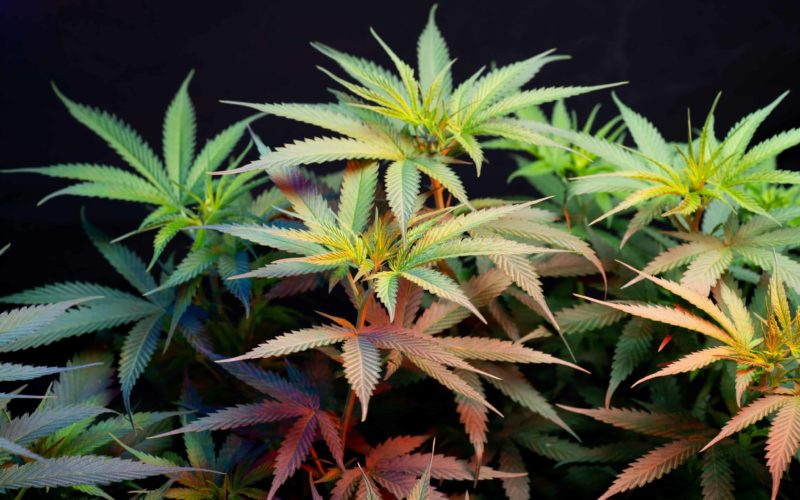Business
Nevada Judge Orders Cannabis Removed From State’s List of Controlled Substances

A Nevada judge has ruled that the Nevada State Board of Pharmacy does not have the authority to regulate cannabis and ordered marijuana removed from the state’s list of controlled substances.
A Clark County, Nevada judge ruled on Wednesday that the state pharmacy board does not have the authority to regulate cannabis and cannabis derivatives under state law and ordered the agency to remove marijuana from the state’s list of controlled substances. In the decision, Clark County District Court Judge Joe Hardy wrote that if the Nevada State Board of Pharmacy “designates a substance as a ‘controlled substance’ but the designation falls outside the authority delegated by the Legislature, the designation is invalid.”
The ruling stems from a case brought against the pharmacy board by the American Civil Liberties Union of Nevada (ACLUNV) on behalf of Antoine Poole and the Cannabis Equity and Inclusion Community, an organization that assists entrepreneurs in launching businesses in Nevada’s legal cannabis industry. ACLUNV attorneys argued that the Schedule 1 classification of cannabis was unconstitutional because voters had legalized medical marijuana with the passage of a constitutional amendment in 1998. Last month, Hardy ruled that the Schedule 1 classification was unconstitutional.
“The constitutional right to use marijuana upon the advice of a physician does establish that marijuana has an accepted medical use and treatment in the United States,” Hardy ruled in a September decision cited by the Las Vegas Review-Journal.
The new ruling this week is focused on the pharmacy board’s authority to regulate cannabis. ACLUNV attorneys argued that despite the legalization of medical marijuana and the availability of regulated medicinal cannabis in Nevada since 2000, the pharmacy board continued to list cannabis similarly to illicit substances including heroin and methamphetamine. Lawyers for the pharmacy board countered that the listing was warranted because of the continued listing of marijuana as a Schedule 1 substance under federal law, an assertion rejected by the plaintiffs’ counsel.
“The notion that a state agency is able to engage in unlawful actions because it’s happening at the federal government – it’s just not the way it works,” Athar Haseebullah, the executive director of the American Civil Liberties Union of Nevada (ACLU), said on July 15 after the first hearing in the case. “They don’t work for the feds. We didn’t sue the DEA here. We sued the State Board of Pharmacy because this is a state action.”
In his ruling, Hardy wrote that “the Board exceeded its authority when it placed, or failed to remove marijuana, cannabis, and cannabis derivatives on its list as Schedule I substances.”
Advocates Applaud Nevada Judge’s Ruling
After the ruling, ACLUNV noted that the decision means the pharmacy board does not have the authority to regulate cannabis under any schedule. Legal director Chris Peterson praised the judge’s ruling, saying that there has “been an ongoing inconsistency with how Nevada categorizes cannabis.”
“For some people, it’s a medicine or a good time on a Friday night, and for some people it was a felony,” Peterson said in a statement from the civil rights organization. “We’re glad that we’ve now resolved this inconsistency to prevent further injustice, and we’ll continue our work to ensure that the promise of cannabis decriminalization is realized in Nevada.”
Shawn Hauser, a partner at the cannabis and psychedelics law firm Vicente Sederberg LLP, said that Hardy’s ruling “is a positive development in cannabis reform, in line with recognition by federal lawmakers and the public that cannabis has known medicinal value, can be safely regulated, and is not properly classified as a schedule 1 controlled substance that has no accepted medical use.”
“Like Colorado, Nevada legalized cannabis through its constitution and developed a robust state regulatory system governing cannabis businesses,” Hauser said. “This case is important precedent confirming that state agencies cannot take action in conflict with state constitutional and statutory provisions, despite the illegality of cannabis under federal law.”
Ashley Dodson, the president and co-founder of Cannabis Equity and Inclusion Community, said that the court’s ruling on Wednesday will help foster social equity in Nevada’s regulated cannabis industry.
“Cannabis has been legal in Nevada for decades, but that hasn’t stopped law enforcement from treating Black and Brown people like criminals. We’re grateful for the ACLU of Nevada for taking this case on and for Judge Hardy for hearing it with fairness and dignity,” Dodson said in a statement. “As far as social equity is concerned, we’ve seen businesses act strategically to keep Black and Brown people out of the unlicensed market by preventing pathways to ownership. CEIC is hopeful that as the last loopholes allowing for the criminalization of cannabis fall by the wayside, we can get back to our original mission of assisting the communities harmed the most by the failed War on Drugs find a way into the industry.”
Business
New Mexico cannabis operator fined, loses license for alleged BioTrack fraud

New Mexico regulators fined a cannabis operator nearly $300,000 and revoked its license after the company allegedly created fake reports in the state’s traceability software.
The New Mexico Cannabis Control Division (CCD) accused marijuana manufacturer and retailer Golden Roots of 11 violations, according to Albuquerque Business First.
Golden Roots operates the The Cannabis Revolution Dispensary.
The majority of the violations are related to the Albuquerque company’s improper use of BioTrack, which has been New Mexico’s track-and-trace vendor since 2015.
The CCD alleges Golden Roots reported marijuana production only two months after it had received its vertically integrated license, according to Albuquerque Business First.
Because cannabis takes longer than two months to be cultivated, the CCD was suspicious of the report.
After inspecting the company’s premises, the CCD alleged Golden Roots reported cultivation, transportation and sales in BioTrack but wasn’t able to provide officers who inspected the site evidence that the operator was cultivating cannabis.
In April, the CCD revoked Golden Roots’ license and issued a $10,000 fine, according to the news outlet.
The company requested a hearing, which the regulator scheduled for Sept. 1.
At the hearing, the CCD testified that the company’s dried-cannabis weights in BioTrack were suspicious because they didn’t seem to accurately reflect how much weight marijuana loses as it dries.
Company employees also poorly accounted for why they were making adjustments in the system of up to 24 pounds of cannabis, making comments such as “bad” or “mistake” in the software, Albuquerque Business First reported.
Golden Roots was fined $298,972.05 – the amount regulators allege the company made selling products that weren’t properly accounted for in BioTrack.
The CCD has been cracking down on cannabis operators accused of selling products procured from out-of-state or not grown legally:
- Regulators alleged in August that Albuquerque dispensary Sawmill Sweet Leaf sold out-of-state products and didn’t have a license for extraction.
- Paradise Exotics Distro lost its license in July after regulators alleged the company sold products made in California.
Golden Roots was the first alleged rulebreaker in New Mexico to be asked to pay a large fine.
Source: https://mjbizdaily.com/new-mexico-cannabis-operator-fined-loses-license-for-alleged-biotrack-fraud/
Business
Marijuana companies suing US attorney general in federal prohibition challenge

Four marijuana companies, including a multistate operator, have filed a lawsuit against U.S. Attorney General Merrick Garland in which they allege the federal MJ prohibition under the Controlled Substances Act is no longer constitutional.
According to the complaint, filed Thursday in U.S. District Court in Massachusetts, retailer Canna Provisions, Treevit delivery service CEO Gyasi Sellers, cultivator Wiseacre Farm and MSO Verano Holdings Corp. are all harmed by “the federal government’s unconstitutional ban on cultivating, manufacturing, distributing, or possessing intrastate marijuana.”
Verano is headquartered in Chicago but has operations in Massachusetts; the other three operators are based in Massachusetts.
The lawsuit seeks a ruling that the “Controlled Substances Act is unconstitutional as applied to the intrastate cultivation, manufacture, possession, and distribution of marijuana pursuant to state law.”
The companies want the case to go before the U.S. Supreme Court.
They hired prominent law firm Boies Schiller Flexner to represent them.
The New York-based firm’s principal is David Boies, whose former clients include Microsoft, former presidential candidate Al Gore and Elizabeth Holmes’ disgraced startup Theranos.
Similar challenges to the federal Controlled Substances Act (CSA) have failed.
One such challenge led to a landmark Supreme Court decision in 2005.
In Gonzalez vs. Raich, the highest court in the United States ruled in a 6-3 decision that the commerce clause of the U.S. Constitution gave Congress the power to outlaw marijuana federally, even though state laws allow the cultivation and sale of cannabis.
In the 18 years since that ruling, 23 states and the District of Columbia have legalized adult-use marijuana and the federal government has allowed a multibillion-dollar cannabis industry to thrive.
Since both Congress and the U.S. Department of Justice, currently headed by Garland, have declined to intervene in state-licensed marijuana markets, the key facts that led to the Supreme Court’s 2005 ruling “no longer apply,” Boies said in a statement Thursday.
“The Supreme Court has since made clear that the federal government lacks the authority to regulate purely intrastate commerce,” Boies said.
“Moreover, the facts on which those precedents are based are no longer true.”
Verano President Darren Weiss said in a statement the company is “prepared to bring this case all the way to the Supreme Court in order to align federal law with how Congress has acted for years.”
While the Biden administration’s push to reschedule marijuana would help solve marijuana operators’ federal tax woes, neither rescheduling nor modest Congressional reforms such as the SAFER Banking Act “solve the fundamental issue,” Weiss added.
“The application of the CSA to lawful state-run cannabis business is an unconstitutional overreach on state sovereignty that has led to decades of harm, failed businesses, lost jobs, and unsafe working conditions.”
Business
Alabama to make another attempt Dec. 1 to award medical cannabis licenses

Alabama regulators are targeting Dec. 1 to award the first batch of medical cannabis business licenses after the agency’s first two attempts were scrapped because of scoring errors and litigation.
The first licenses will be awarded to individual cultivators, delivery providers, processors, dispensaries and state testing labs, according to the Alabama Medical Cannabis Commission (AMCC).
Then, on Dec. 12, the AMCC will award licenses for vertically integrated operations, a designation set primarily for multistate operators.
Licenses are expected to be handed out 28 days after they have been awarded, so MMJ production could begin in early January, according to the Alabama Daily News.
That means MMJ products could be available for patients around early March, an AMCC spokesperson told the media outlet.
Regulators initially awarded 21 business licenses in June, only to void them after applicants alleged inconsistencies with how the applications were scored.
Then, in August, the state awarded 24 different licenses – 19 went to June recipients – only to reverse themselves again and scratch those licenses after spurned applicants filed lawsuits.
A state judge dismissed a lawsuit filed by Chicago-based MSO Verano Holdings Corp., but another lawsuit is pending.
Source: https://mjbizdaily.com/alabama-plans-to-award-medical-cannabis-licenses-dec-1/
-

 Business2 years ago
Business2 years agoPot Odor Does Not Justify Probable Cause for Vehicle Searches, Minnesota Court Affirms
-

 Business2 years ago
Business2 years agoNew Mexico cannabis operator fined, loses license for alleged BioTrack fraud
-

 Business2 years ago
Business2 years agoAlabama to make another attempt Dec. 1 to award medical cannabis licenses
-

 Business2 years ago
Business2 years agoWashington State Pays Out $9.4 Million in Refunds Relating to Drug Convictions
-

 Business2 years ago
Business2 years agoMarijuana companies suing US attorney general in federal prohibition challenge
-

 Business2 years ago
Business2 years agoLegal Marijuana Handed A Nothing Burger From NY State
-

 Business2 years ago
Business2 years agoCan Cannabis Help Seasonal Depression
-

 Blogs2 years ago
Blogs2 years agoCannabis Art Is Flourishing On Etsy













